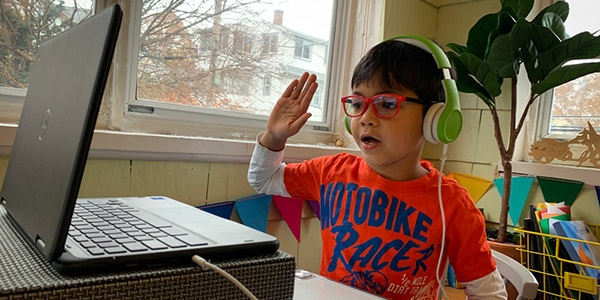SAID AND DONE
MIT SCHOOL OF HUMANITIES, ARTS, AND SOCIAL SCIENCES
QUOTABLE
"Finding solutions to climate change will require the collective expertise of many fields. And the more our research institutions can invent practical ways for these various forms of knowledge to become mutually informing, the more quickly we can generate effective climate solutions.”
— Melissa Nobles, Kenan Sahin Dean of the MIT School of Humanities, Arts, and Social Sciences
SOLVING CLIMATE

MIT CLIMATE SYMPOSIUM
Universities can lead the way on climate action | Dean Melissa Nobles
Nobles highlighted examples of MIT's wide-ranging, climate-related work in the humanistic fields, including projects in development economics, moral philosophy, political science, public communications, and the arts — and advocated for increasing multidisciplinary approaches to the climate crisis.
Story by Peter Dizikes | Watch the video | Slides
MIT CLIMATE PORTAL
MIT SHASS on the Climate Portal
MIT CLIMATE GRAND CHALLENGES
Explore the research goals
RESEARCH | GOVERNANCE
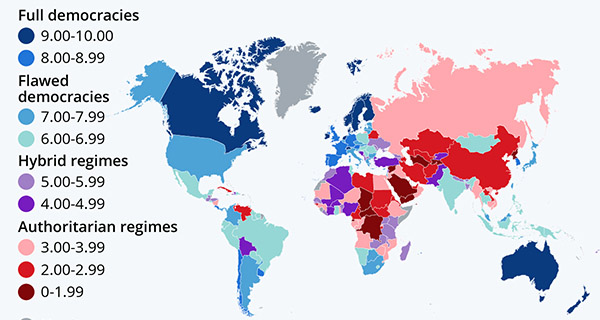
Global democracy index rates, 2019. Tracks electoral process; pluralism; civil liberties; government functioning; political participation, and political culture. Via The Economist
CENTER FOR INTERNATIONAL STUDIES
Democracy in distress
"Today democracies die at the hands not of generals, but of elected leaders, presidents, prime ministers who use the very institutions of democracy to subvert it.” At an MIT CIS Starr Forum, experts analyze democracies that collapse from within while maintaining a veneer of legitimacy.
Story by Peter Dizikes
MIT TOWN HALL ON THE 2020 ELECTION
Dean Melissa Nobles interviews Charles Stewart III, head of the MIT Election Lab
In the midst of a complex national election, Stewart discussed: the importance of fact-based analysis when dealing with election uncertainties; the success of the U.S. electoral administration system; and the current challenges to American democracy.
Watch the webcast
MIT ELECTION LAB | HEALTHY ELECTIONS PROJECT
Administrators, ordinary citizens together made a fair, safe, secure election possible
Leading election experts Charles Stewart III of MIT and Nathaniel Persily of Stanford, co-founders of the Healthy Elections Project, cite the smooth administration of the 2020 Election, suggest updates for the mail-in balloting process, and give thanks for "the heroic and successful efforts of election administrators around the country."
Story
POLITICAL SCIENCE
MIT GOV/LAB unveils new tools for engaged scholarship
To support their work to inform policies with citizen input and scientific data, the GOV/LAB team introduces new tools, including a Risk & Equity Matrix and materials on How to Have a Difficult Conversation.
Learn more + access the tools
J-PAL | ABDUL LATIF JAMEEL POVERTY ACTION LAB
Governance, Crime, and Conflict Initiative funds 98 projects, across 33 countries
The funding partners summarize the lessons to be learned from their innovative research portfolio. The map below features locations of GCCI-funded research that identifies policies that effectively promote good governance and peace, reduce crime, and support recovery from conflict.
Story
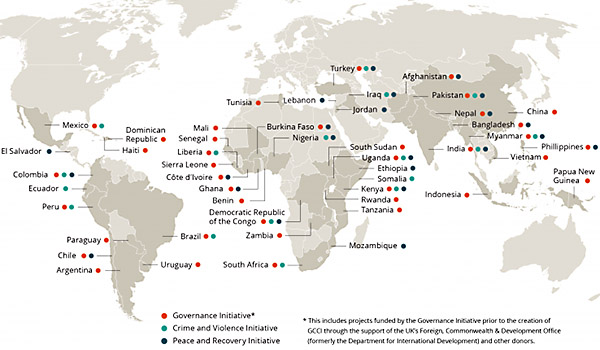
RESEARCH | IMPACT OF TECHNOLOGY

MIT TASK FORCE ON THE WORK OF THE FUTURE
Final report outlines route toward better jobs, wider prosperity
The task force report, led by Elizabeth Reynolds, David Autor, and David Mindell, identifies ways to align new technologies with durable careers — presenting six conclusions and a set of policy recommendations that would enable more people to enjoy good careers even as innovation transforms workplaces.
Story | Final Report | Related: Don't fear the robots | Congress on AI & Work of the Future
ECONOMICS
The impact of technology on health care workers | John Van Reenen
A key question in healthare is if advances in information technology might automate away the jobs of health workers. Van Reenen reports that "Our work, consistent with a small literature, finds no significant job displacement effects or falls in wages."
Story
SECURITY STUDIES
A new world of warcraft | Erik Lin-Greenberg
Greenberg, an assistant professor of political science, explores how a burgeoning high-tech arsenal is shaping military conflict, and assesses "factors that may determine whether there’s war or peace.”
Story
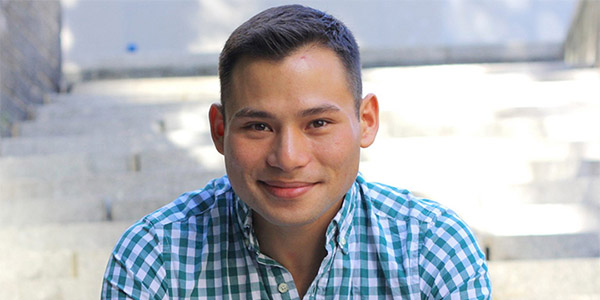
Erik Lin-Greenberg, assistant professor of political science
BRAVO!
2021 WORLD UNIVERSITY RANKINGS | TIMES HIGHER EDUCATION
MIT's social science fields ranked No.1, arts and humanities fields No.2, worldwide
View rankings: Arts and Humanities | Social Sciences
MEDIA + AWARDS DIGEST, NOV 2020
MIT's humanistic community in the limelight
Browse the digest
NEW BOOKS AND CREATIVE WORKS
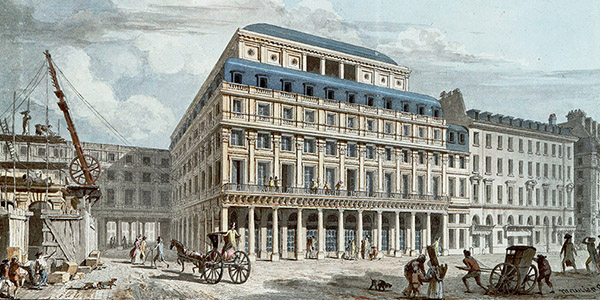
Salle Richelieu, which became the home of the Comédie-Française in 1799;
MEET OUR STUDENTS
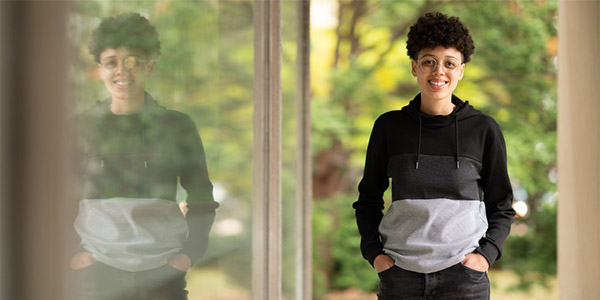
Mimi Wahid '21, majors in writing and urban studies
WRITING + URBAN STUDIES
Meet the MIT Bilinguals: Mimi Wahid
A storyteller dedicated to environmental justice. Exploring her identity through writing has clarified senior Mimi Wahid’s desire to serve rural Southern communities like her hometown.
Story
POLITICAL SCIENCE | MIT GOV/LAB
Finding patterns in the noise | Shiyao "Sean" Liu
Using novel computational approaches, political science doctoral candidate Liu develops better tools for analyzing data. Through statistical methods he has devised, Liu can detect and eliminate random-seeming answers that make for a noisy data set.
Story | Political Methodology Lab
DATA, ECONOMICS, AND DEVELOPMENT POLICY | MICRO-MASTERS
Does increased women’s employment/wages reduce domestic violence?
Isadora Frankenthal, a young Brazilian economist, is answering this question via our online MicroMasters program in Data, Economics, and Development Policy.
Story | Related: First cohort earn masters degrees in DEDP
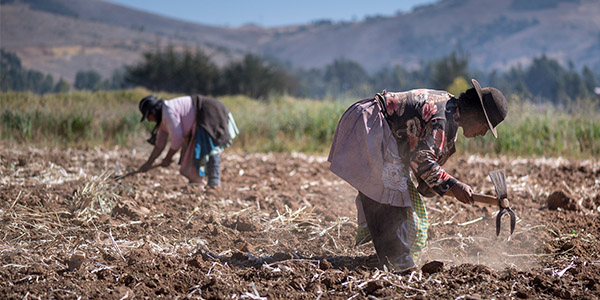
“I want to continue working on this, to understand the underlying mechanisms," says Isadora Frankenthal. Her research aims to reduce domestic violence, which remains a pervasive problem globally, with heavy costs to individuals and economies.
EXPLORE
Follow us
Subscribe to Said and Done
10 issues a year
Media Digest
Current coverage
Making a Better World: Impact and Research
Browse 12 sectors
Perspectives for the Pandemic
Explore the Series
Making a Just Society
Explore the Resources
Solving Climate
Browse the Commentaries
Ethics, Computing, and AI: Perspectives from MIT
Full Series
Computing and AI: Humanistic Perspectives from MIT
Full Series
MIT Climate website
A major source of research, innovation, and discussion
Join us!
SHASS on MIT News
Research and Features
MIT Campaign for a Better World
Story | Join Us
Published by SHASS Communications
Office of the Dean, MIT School of Humanities, Arts, and Social Sciences
Editor and Designer: Emily Hiestand
Publication Associate: Alison Lanier
Published 18 November 2020

